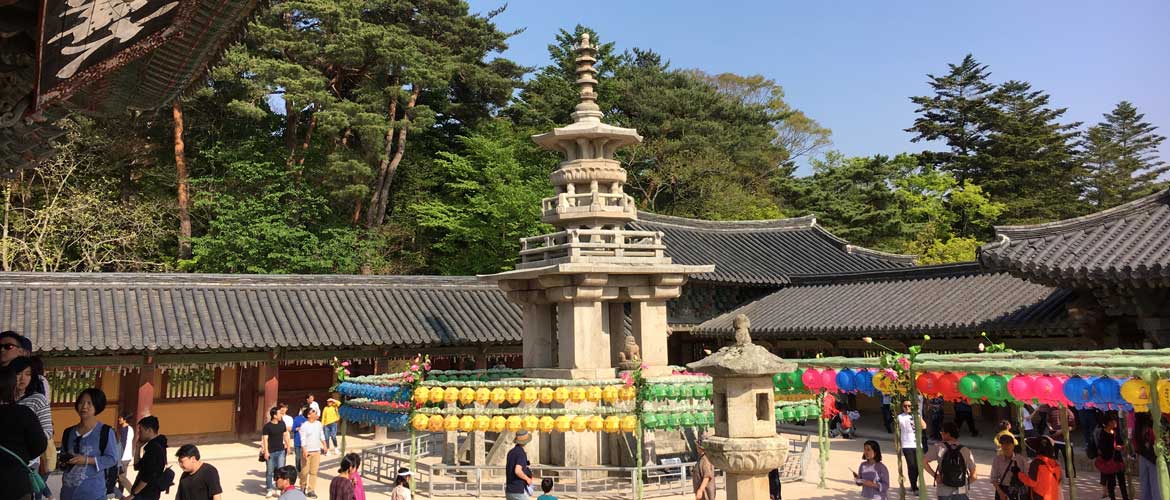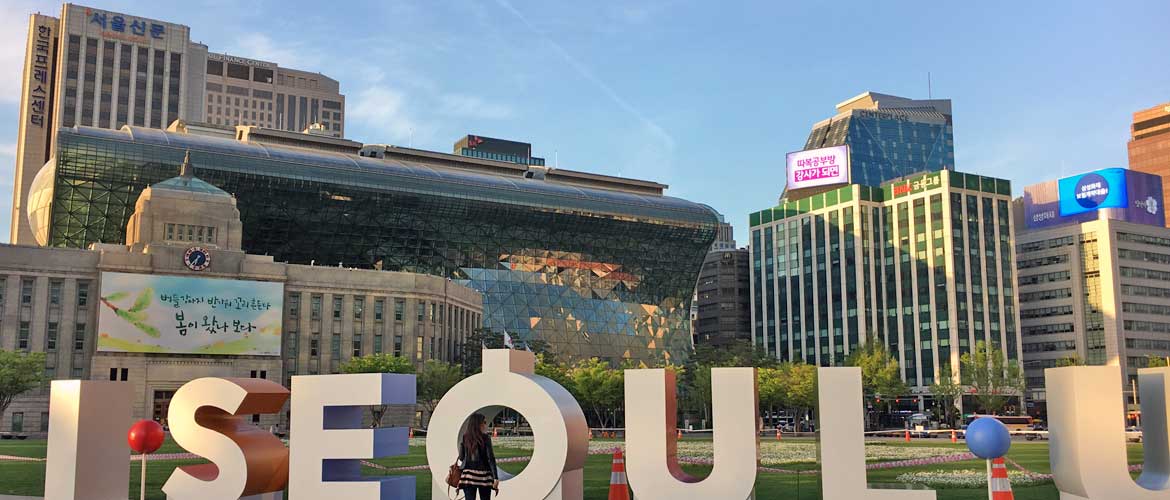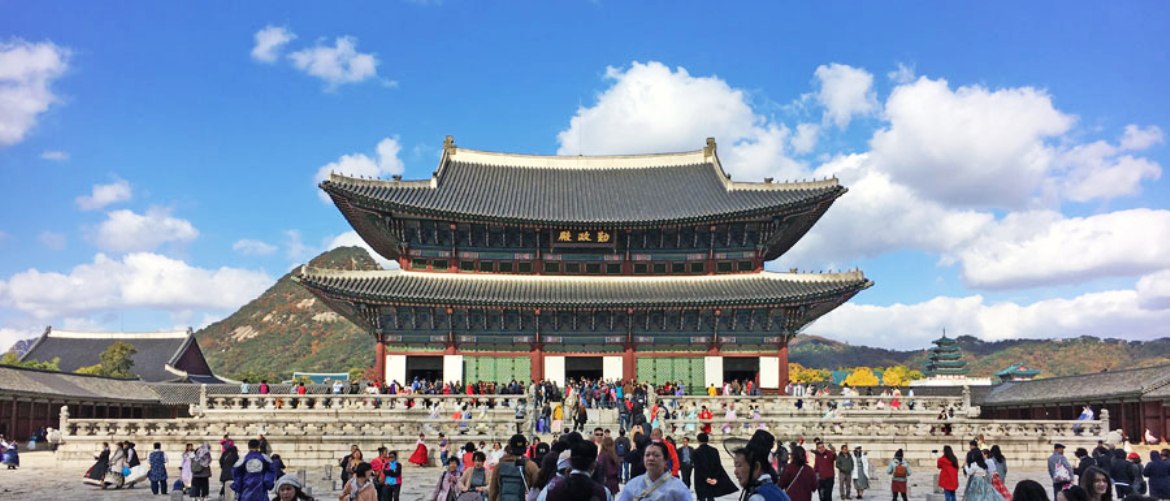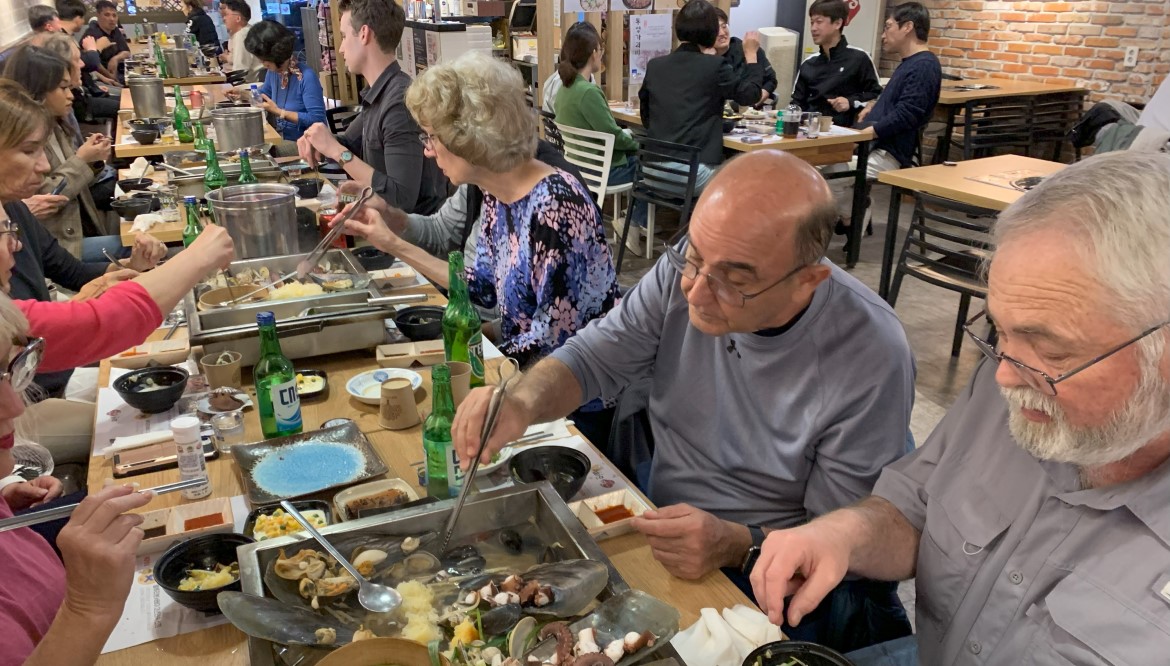
Seoul – Jeju Island – Busan – Gyeongju – Seoul
Embark on an enchanting journey through the heart of South Korea and immerse yourself in the rich tapestry of Korean culture and landscapes, where ancient traditions blend harmoniously with modern marvels. From the bustling streets of Seoul to the serene beauty of Jeju Island, each day promises a new adventure, filled with captivating sights and immersive experiences.
Important Features
- Small group size (average 15, maximum 20)
- Expert professional guides
- Luxury hotel accommodations
- Quality local and Western cuisines
- Korean BBQ farewell dinner in a high-end restaurant
- Excursion to the Demilitarized Zone near Seoul

Meal Code: B = breakfast / L = lunch / D = dinner
Day 1/Wed: Departing for Seoul
Your South Korea vacation begins with international flight departing from a city of your choice. The tour price doesn’t include international airfare.
Day 2/Thu: Arrival in Seoul
Upon arrival, transfer to the centrally located hotel on your own, which can be easily done by taxi or airport limousine bus or airport express train. The 50 km cab ride from Incheon International Airport costs between 70,000 and 100,000 Korean Won ($56-$80 US) including expressway toll charge. The Airport Railroad Express train travel between the airport and Seoul Station costs 9,000 Won ($7 US); from Seoul Station, taking a cab to the hotel costs just a few dollars. The deluxe limousine bus from the airport to the hotel costing 18,000 won ($14 US) may be an ideal choice depending on your flight schedule.
Day 3/Fri: Seoul – Jeju Island (B/L)
Seoul, the capital of South Korea, is a huge metropolis where modern skyscrapers, high-tech subways and pop culture meet Buddhist temples, palaces and street markets.
Our sightseeing today includes Gyeongbok Palace and Bukchon Hanok Village (traditional residential area on a hill inside the city).
Late afternoon flight to Jeju City, capital of Jeju Island.
Day 4/Sat: Jeju Island (B/L)
The 1,849 km² Island in the Korea Strait is famous for beautiful beaches, volcanic landscape of craters and cave-like lava tubes. Hallasan Mountain, a dormant volcano, features hiking trails, a crater lake at the 1,950m summit and nearby Gwaneumsa Temple.
The full-day guided sightseeing includes Manjang Cave, Seongsan Ilchulbong, Seongeup folk village, and Sangumburi crater.
Day 5/Sun: Jeju Island (B)
Free day to relax or explore on your own.
Day 6/Mon: Jeju – Busan (B/D)
Free morning. The late afternoon flight to Busan takes one hour.
Busan, sometimes spelled as Pusan, is the largest port and second largest city in South Korea with a current population around 3.5 million. The city is known for its beaches, mountains, temples, and long history of trade and cultural exchange with Japan.
Enjoy a seafood dinner in a small, family-run restaurant within walking distance of the hotel.
Day 7/Tue: Busan (B/L)
Today’s sightseeing begins with a visit to United Nations Memorial Cemetery. Established in January 1951, the 35-acre burial ground contains 2,300 graves of fallen soldiers who fought on the side of the United Nations during the Korean War (Jun 25, 1950 – Jul 27, 1953). The majority of the interred soldiers were from the Commonwealth of Nations including the United Kingdom (886), Canada (378), Australia (281), New Zealand (34) and South Africa (11). A South Korean guard of honour carries out flag ceremonies daily.
We then proceed to Jagalchi fish market, the largest seafood market in South Korea. Today’s schedule ends with a leisurely walk at Haeundae Beach.
Day 8/Wed: Busan – Gyeongju – Seoul (B/L)
Following breakfast we drive 100 kilometres northeast to Gyeongju. The city was the capital of the 1,000-year-long Silla dynasty and possesses extensive remains to prove its cultural and historical significance.
Our sightseeing in Gyeongju begins at the 8th-century Bulguksa, a magnificent Buddhist temple complex featuring stone pagodas, a series of wooden buildings on raised stone terraces, and a large bronze Buddha. A masterpiece of the golden age of Buddhist art in the Silla kingdom, the temple is classified as Historic and Scenic Site No. 1 by the South Korean government and is also listed by UNESCO as a World Heritage Site.
The Gyeongju National Museum is next on our schedule. The museum houses a large collection of relics from the Silla era giving the visitor a deep insight into the ancient kingdom.
The afternoon train journey to Seoul takes just over 2 hours (KTX #40, 15:07/17:14, 300 km).
Day 9/Thu: Seoul – DMZ – Seoul (B/L/D)
We spend the morning visiting the the Demilitarized Zone (DMZ). The DMZ divides North Korea and South Korea and is one of the last remnants of the Cold War. The DMZ runs across the Korean Peninsula and roughly follows the 38th parallel north (popular name given to latitude 38° N) on an angle, with the west end of the DMZ lying south of the parallel and the east end lying north of it. With over a million soldiers on watch each day, this stretch of land measuring 250 kilometres (160 miles) long and about 4 kilometres (2.5 miles) wide is the most fortified border in the world.
Free afternoon to explore on your own. Our recommendations include the National Museum of Korea, War Memorial of Korea, and Changdeokgung (Changdeok Palace).
Farewell dinner is Korean BBQ in a high-end restaurant.
Day 10/Fri: Returning Home (B)
Your memorable South Korea tour ends this morning. Transfer to Incheon International Airport, 50 km west of Seoul, on your own. Taxi costs between 70,000 and 100,000 Korean won (US$56 to US$80) including expressway toll charge, but most of our guests prefer the airport limousine bus for its convenience and low cost. The Airport Railroad Express which costs 9,500 won (US$7.50) one way per person is even more affordable. Detailed and up-to-date information on airport transfer will be included in the final update two weeks before the tour starts.

| City | Night | Hotel | Category |
| Seoul – 1st stay | 1 | Lotte Hotel Seoul | Luxury / 5 stars |
| Jeju Island | 3 | The Suites Hotel Jeju | Luxury / 5 stars |
| Busan | 2 | Lotte Hotel Busan | Luxury / 5 stars |
| Seoul – 2nd stay | 2 | Lotte Hotel Seoul | Luxury / 5 stars |
Dates and Prices
Prices are per person based on double occupancy. See Terms & Conditions for cancellation penalty.
| Depart (Wed) | Return (Fri) | Land Only CA$/US$ |
Single Supplement CA$/US$ |
| 2025 | |||
| 08-Oct | 17-Oct | $6,156/$4,560 | $2,498/$1,850 |
| 15-Oct | 24-Oct | $6,156/$4,560 | $2,498/$1,850 |
| 22-Oct | 31-Oct | $6,156/$4,560 | $2,498/$1,850 |
| 29-Oct | 07-Nov | $5,873/$4,350 | $2,363/$1,750 |
| 05-Nov | 14-Nov | $5,603/$4,150 | $2,295/$1,700 |
| 12-Nov | 21-Nov | $5,468/$4,050 | $2,228/$1,650 |
| 19-Nov | 28-Nov | $5,333/$3,950 | $2,228/$1,650 |
|
What the tour price includes:
|
What the tour price excludes:
See Terms & Conditions for more information. |

Passport & Visa
Your passport needs to have at least one blank visa page and six months validity at the end of the tour.
If you are a visitor from Canada, the US, the UK, Australia and New Zealand, you do not need a visa to enter South Korea as long as your stay is within 90 days.
Vaccination
No vaccination is required to enter South Korea. Any negative development in this regard will be communicated with you in due course.
Travel Health
South Korea enjoys high standards of public health. Tap water is potable. Some locals may boil tap water to get rid of the possible taste of chlorine. Always carry a roll of toilet paper and a bottle of hand sanitizer. In general, public toilets do not provide paper towels for hand drying; many of them have no electric hand dryers either. You may want to carry around a small towel as many locals do. Footwear must be removed when you go indoors at some temples, historical sites and traditional restaurants; it is advisable that you carry one pair of thick socks in your day pack to keep your feet comfortable at such places.
Local Currency & Credit Card
South Korea: won (KRW)
Withdrawing cash from local ATMs after arrival remains our recommended method of currency exchange. Keep your inventory of local currency low. Your tour fare already covers all the expensive items. You only need some cash for incidentals and meals not included in the tour price. Credit cards are widely accepted across South Korea. Use credit card wherever allowed unless your card issuer charges hefty foreign transaction fees.
Travel Insurance – When to Buy
Your deposit will be kept as credit if you cancel for any reason. The transferable credit has no expiration date. Therefore, it may be unnecessary to spend $30 to $50 on cancellation insurance just to protect the deposit.
However, purchase of trip cancellation & emergency medical insurance is strongly advised when your balance is due. If you don’t have proper coverage, the loss can be devastating in case of cancellation before or after commencement of the booked trip or in case of a serious medical emergency during the trip. Please ask us for premium quotes when your balance due date is near.
